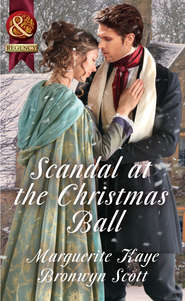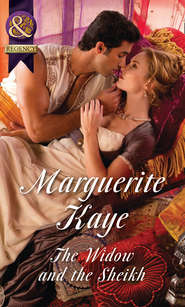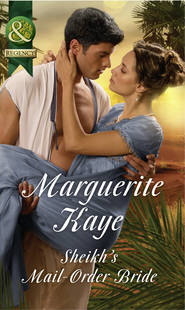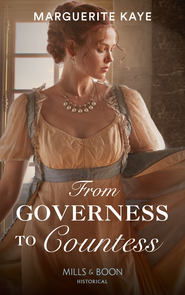По всем вопросам обращайтесь на: info@litportal.ru
(©) 2003-2024.
✖
A Winter Wedding: Strangers at the Altar / The Warrior's Winter Bride
Настройки чтения
Размер шрифта
Высота строк
Поля
‘I have no idea what to make of you, and right at this moment, I don’t really care. You made me laugh, and honestly, after what that lawyer told me, I didn’t think that was possible.’
Her smile softened sympathetically. ‘It sounds like I am not the only one in need of a dram,’ she said. ‘Why not! I’ve nothing at home waiting for me except final demands and most likely a few bailiffs. Buy me a drink, Mr Drummond, and we can compare our woes, though I warn you now that mine will far outweigh yours.’
* * *
Ainsley McBrayne wondered what on earth had come over her. There had been ample time in the short walk from Parliament Square over the North Bridge for her to change her mind, but she had not. Now here she was, in a secluded corner of the coffee room at the Waterloo Hotel, waiting while a complete stranger bribed one of the waiting staff to bring the pair of them something stronger than tea.
She had surrendered her coat at the door, and her bonnet, too, for they were both wet with that soft, mist-like mizzle that was not quite rain, in which Edinburgh specialised. Her hair, which even on the best of days was reluctant to succumb to the curling iron, was today bundled up into a careless chignon at her nape, and no doubt by now straggling equally carelessly out of it. On a good day, she would tell herself it was chestnut in colour, for it was not red enough to rate auburn, and she was fairly certain there was no such thing as mahogany hair. Today, it was brown, plain and simple and the colour of her mood. At least her gown was one of her better ones. Navy blue worked with silver-grey stylised flowers formed into a linking pattern, the full skirts contrasted with the tightly fitted bodice, with its long narrow sleeves and shawl neck. The narrow belt showed off her slender waist; the crossover pleating at the neck was cut just low enough to allow a daring glimpse of bosom. It had been designed to be worn with a demure white blouse, but this morning Ainsley hadn’t been interested in looking demure. This morning she had not, however, intended to take off her coat. Now, she tugged self-consciously at the pleated shawl collar in an effort to pull it a little closer.
She had been angry when she left the lawyer’s office, though she should not have been, but it seemed, despite all, that she’d not managed to lower her expectations quite enough. There had been a tiny modicum of hope left in her heart, and she’d been furious at herself for that. Hence the tears. Stupid tears. If Mr Innes Drummond had not seen those stupid tears, he’d more than likely have gone on his way and she wouldn’t be here. Instead, she’d be at home. Alone. Or in the company of yet another bailiff. And it wasn’t going to be her home for much longer. So she might as well be here. With a complete stranger. About to imbibe strong liquor, just like one of the loose women she’d claimed she would become.
Not that that was so far-fetched either, given the state of things, except one thing she was absolutely sure about was that she had no talents whatsoever for that sort of thing. In fact, she had not even the skill to interest a man if he didn’t have to pay, if her husband was anything to go by.
Ainsley sighed. Second to tears, she hated self-pity. Giving her collar a final twitch, she forced herself to relax. Mr Drummond was still conferring with the waiter, so she took the chance to study him. His hair, which was cut unfashionably short, was glossily black. He was a good-looking man; there was no doubt about it, with a clean-shaven jaw, and none of the side whiskers gentlemen preferred these days. A high forehead spoke of intelligence, and lines fanning out from his eyes and forming a deep groove from nose to mouth spoke of experience. He looked to be in his mid-thirties, perhaps five years older than herself. A confident man, and well dressed in his dark coat and trousers, his linen impeccably white. Judging by appearances, money was not one of his worries. But then, if one could have judged John by appearances, money had not been one of his worries either. Not that her husband had ever been at all worried by money—or the lack of. No, that was not true. Those sullen silences of his spoke volumes. And latterly, so, too, did his habit of simply disappearing when she challenged him.
Ainsley sighed again, irked with herself. She was absolutely sick and tired of thinking about John. Across the room, Mr Drummond, having concluded his business with the waiter, glanced up and smiled at her. His eyes, under heavy dark brows, were a deep, vivid blue. She felt it then, what she had ignored before, a tug of something quite basic. Attraction. It made her stomach do a silly little flutter. It made her pulses skitter and it made her mouth dry, that smile of his, and the complicit look that accompanied it, as if the pair of them were in cahoots. It made her forget her anger at the injustice of her situation, and it reminded her that though she might well be a penniless widow with debts so terrifying they could not be counted, she was also a woman who had not known the touch of a man for a long time. And this man, this Mr Innes Drummond, who was seating himself opposite her, this man, she was pretty certain, would know exactly how to touch her.
‘So, ladies first.’
Colour flooded her face. She stared at him blankly, horrified at the turn her mind had taken, praying that none of those shocking thoughts were visible on her countenance ‘I beg your pardon?’
‘Your tale of woe, Mrs McBrayne. You tell me yours, and then I’ll tell you mine, and we can decide which of us is worst off.’
He had very long legs. They were stretched out to the side of the table that separated them. Well-made legs. Not at all spindly. And really rather broad shoulders. Well built, that was the phrase she was looking for. Athletic, even. And yes, his face and hands were rather tanned, as if he spent a deal of his life out of doors. ‘What is it you do?’ she asked. ‘I mean—do you—are you a resident here in Edinburgh? Only, you do have an accent, but I cannot place it.’
Instead of taking offence, or pointing out that she had changed the subject, Innes Drummond gave a little shrug. ‘I’m originally from the Highlands, Argyll on the west coast, though I’ve lived in England most of my adult life. I’m an engineer, Mrs McBrayne.’
‘A practical man.’
He smiled. ‘You approve.’
‘I do. It is none of my business, but—yes.’ She smiled back. ‘What do you build?’
‘Railway lines. Tunnels. Canals. Bridges and aqueducts. There is a very high demand for all these things, thanks to the steam locomotive. Though I don’t actually build the things myself, I design them. And even that— Business is very good, Mrs McBrayne. I am afraid I employ a rather large number of men to do most of the real work while I spend too much of my time in the boardroom, though I still like to think of myself as an engineer.’
‘A very successful one, by the sounds of it. I did not think that money could be an issue with you.’
He gave her an enigmatic look before turning his attention to pouring them both a glass of whisky from the decanter that the waiter had deposited. ‘Slàinte!’ he said, touching her glass with his.
‘Slàinte!’ Ainsley took a sip. It was a good malt, peaty and smoky, warming. She took another sip.
‘I take it, then, that money is an issue for you,’ Innes Drummond said.
She nodded. He waited, watching her, turning his glass round and round in his hand. One of the many things she’d learned from her marriage had been how to keep her own counsel—and how to keep her own secrets. Her failures, and the trusting, timid nature that had contributed to them, made her ashamed. She confided in no one, not even Felicity, and Felicity was the best friend she had. But confiding in this stranger, what harm could it do? Whatever had brought him to Edinburgh, he wasn’t likely to be stopping long. If—however—he judged her, she’d be spared the pain of seeing it. Who knew, perhaps articulating her problems might even help her see a path to resolving them.
Catching sight of her wedding band, Ainsley tucked her left hand into the folds of her gown. ‘It is money,’ she said, ‘it comes down to money, and though I tell myself it’s not fair, for I did not spend the money, I know at heart it’s just as much my fault as his.’
* * *
Mrs McBrayne took another sip of whisky. ‘Dutch courage,’ she said, recklessly finishing the amber liquid and replacing the glass on the table before straightening her back and taking an audible breath. Innes wondered what on earth was to come, and wondered if he should stop her confidences, but dismissed this idea immediately. She was steeling herself, which meant she wanted to talk. Besides, he was interested, and it was good to have his mind concentrate on someone else’s woes rather than his own for a while. He took a cautious sip of his own whisky and waited.
‘I will need to go back a bit,’ she said. ‘Are you sure you want to hear this?’ When he nodded, she smiled an on-your-head-be-it kind of smile. ‘So,’ she said, ‘I met my husband, John McBrayne, when I was twenty. Nearly a decade ago. He was very much the gentleman, respectable, handsome, presentable, popular.’ She counted her husband’s assets off on her fingers. ‘He was also what they call a charmer, and I was charmed. I met him at the Assembly Rooms. He was the friend of a friend. He seemed to be a man of means. Within six months, he had proposed, and I was delighted. I was happy. I was in love.’ Another smile, only this one was a bitter little twist. ‘John spoke to my father. My father asked me if I was sure, he told me there was no hurry, that if I wanted to change my mind—but I didn’t, and I didn’t think—I thought Papa was just being his usual cautious self, that’s all. He was always polite to John, never said a word against him to me, and— But I’m getting ahead of myself.’
Innes swallowed the rest of his malt. ‘Do you want another?’ he asked, indicating her glass, and when Mrs McBrayne shook her head, resisted the urge to pour one for himself. ‘Go on.’
‘We were happy. I find I have to remind myself of that, but for a year or so we were happy. Then the bills started to go unpaid, and when I asked John, he told me not to worry. But I did, and when I eventually looked into matters properly, I discovered we owed a monstrous amount. My husband was furious when he found out that I knew, he told me it was a temporary situation, he told me—ach, he told me all sorts, and I believed some of it, because I wanted to. I’d never enquired about his income until then, I had assumed my father—but there, you see, I’m putting the blame on others when it was my own fault. I should have asked right at the start. I should have made it my business, but by the time I did, it was too late.’
‘You mean that by that time, your husband’s debts were unmanageable?’
‘I mean it was too late for me to persuade my husband that his debts were not only his business but mine, too,’ Mrs McBrayne responded wryly. ‘I think I will have another, if you don’t mind.’
She was pale despite the whisky, her mouth thinned, her eyes focused inwards. When she sipped her drink, her hand trembled. Noticing that, she placed the glass carefully down. It was a common enough tale, but the way she told it was not at all common. Her feelings ran very deep. Innes was struggling to understand why.
‘I told you you wouldn’t understand,’ she said, taking him aback by seeming to read his thoughts.
He made no attempt to deny it. ‘Explain it, then,’ Innes said.
‘Imagine how you would feel if someone else was given control of your business. Imagine how you’d feel if they could make decisions about it over your head, without consulting you. Decisions that had consequences for you, but that you had no say in. Now imagine that at first you don’t realise this is going on. Then when you do realise, and you challenge this person, they tell you that they’re only doing what is expected of them. Then they tell you that you’ve no right to challenge them. And then they simply turn a cold shoulder. As a businessman, you can do something about it. You can even take action in court, if that person’s been fraudulent. As a wife...’ Mrs McBrayne spread her hands and gave him another of those bitter smiles. ‘As a wife, you can choose to make both your lives a misery with constant nagging, or you can put up and shut up. What you can’t do is change a thing. Not a single damn thing.’
Innes felt slightly sick. Having sworn all those years ago never to marry, he had never actually considered the state of matrimony from any point of view. Mrs McBrayne’s perspective was horrible, and all the more so for the almost cool way she described it. Almost cool—for he was willing to bet that her fist was tightly clenched in the folds of her gown, and there was hurt in those hazel eyes as well as anger. He felt angry on her behalf, though he knew her husband had done nothing that society would condemn. In fact, more likely society would condone, for a man was expected to take care of his wife, and a wife—was it true, that a woman was expected simply to put up and shut up, as Mrs McBrayne so succinctly put it?
Innes put his glass down, and ran an agitated hand through his hair. ‘You’re right, if I were in such a situation— It sounds intolerable.’
‘And yet I bore it,’ she said bitterly. ‘I wonder if things would have been different had I not. I thought of leaving him, but lack of funds made that impractical, and I would not go to my father. Edinburgh might appear to be a large town, but in practice it is not much more than a village. My leaving my husband’s protection would have caused quite a scandal. Besides, I was— I was ashamed.’ She glared at him as she said this. ‘I was under the misapprehension that if I’d behaved differently I could have changed my husband,’ she said. ‘It took me some time to realise that since he would never change, then I must.’
She concluded with a small, satisfied smile that made Innes wonder how, exactly, she had changed and what, exactly, the effect had been on her spendthrift husband, but before he could ask, her smile had faded. She took a sip of whisky. Her hand was quite steady now. ‘I remained with my husband, but matters between us were extremely strained. John devoted himself to myriad schemes he found to lose money, and I—I pursued a new interest of my own which was distracting and made me feel not quite so useless, but ultimately, I was burying my head in the sand. And then my father died, and his will dealt our marriage a death blow.’
‘The trust?’
She nodded. ‘I discovered later that John had asked him for money. Neither of them saw fit to inform me of that fact.’ Her eyes blazed. ‘My own father! I thought he trusted me. I thought— But there, I was wrong. Money is a matter for the man of the house, apparently.’ The fire disappeared from her eyes as quickly as it had come. ‘To cut a long and tedious story short, my father changed his will so that my entire inheritance was put into trust for my first child. He did not specify the sex, so at least I should be grateful for that—not that it makes any difference, since there is no child. When John found out, he...’ Her voice wavered, but she quickly got it back under control. ‘He was furious. He wanted to break the trust. He wanted me to find a way to break the trust, to use the law to go against my own father’s wishes. It was not exactly conducive to marital harmony. Not that there was much of that by then. When I wouldn’t cooperate—well, it seems I didn’t have to, for what was mine was actually my husband’s. Fortunately for my father’s wishes, though not so fortunately for my husband and his creditors, the trust could not be broken. And then my husband died.’
Her voice was hard. Obviously, the love she’d felt for the man she had married was long gone. ‘How?’ Innes asked, wondering fleetingly if she was about to confess to killing him. There was a bit of him that would not have been surprised. A bit of him that would have approved.
‘Pleurisy,’ she replied. ‘They found him dead drunk down in the Cowgate, out cold in a puddle. Heaven knows how long he’d been there or where he’d been before. He had not been home for three days.’
Was that what she’d meant when she implied she knew more than any respectable woman ought, about the women who plied their business in that scurrilous area? He wanted to ask, but he didn’t want to distract her. Despite the sorry tale she’d told him, she was defiant, and he couldn’t help but admire her for that. ‘I take it then, that your husband left you with nothing?’ Innes said.
‘Nothing but debts. Not even my jointure, for it was to be sourced from investments that are now worthless. There is a mortgage on our house that becomes due in a month, a year after his death, and my father’s trust is so watertight that, as Mr Thomson confirmed this morning, not even my utter ruin can break it. But you know, it’s not even the money that bothers me. It’s the extent to which I have been kept in the dark—allowed myself to be kept in the dark—not just by John, but by my father. It makes me feel about this size.’ Mrs McBrayne held her thumb and index finger about an inch apart. ‘That’s how much of a say they gave me in my own life.’
‘I am sure your father meant only to protect you.’
‘Because I’m nothing but a frail female without a mind of my own?’ she snapped. ‘It made me wonder how many hundreds, thousands more of us poor wee souls there are out there, living life blindfolded.’
‘You make it sound like a conspiracy.’
‘That’s because it feels like one, and not even Madame He...’
‘Madame He?’











